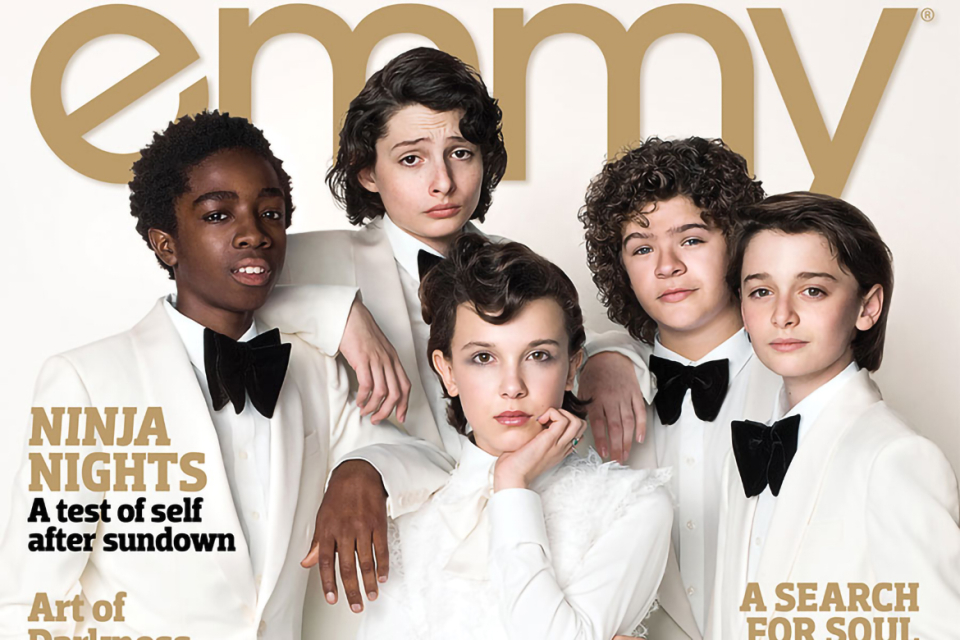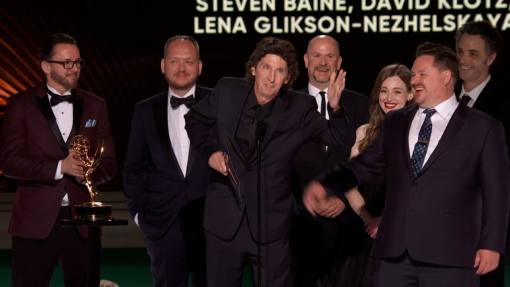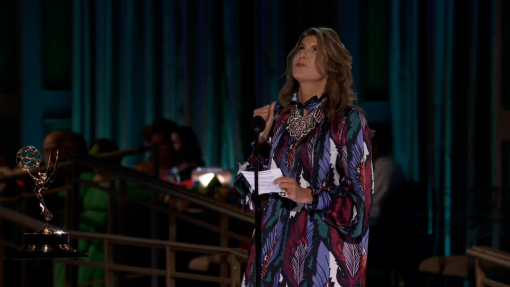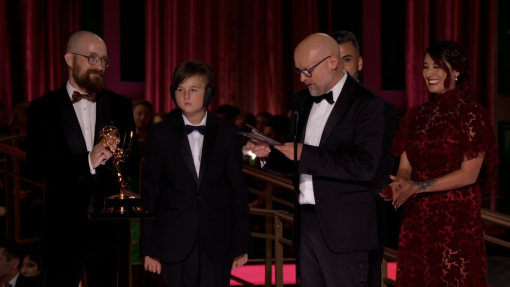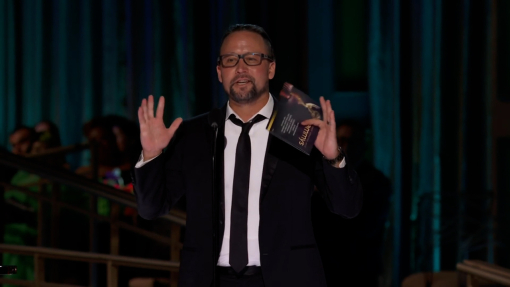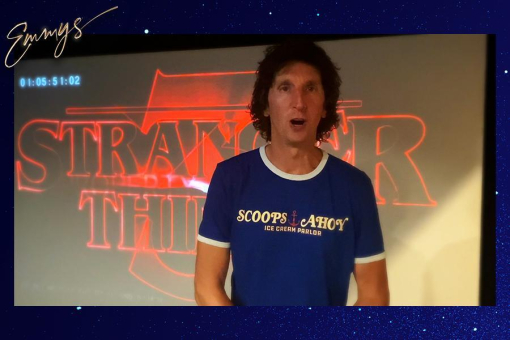On a hot March morning in Atlanta, Finn Wolfhard and Noah Schnapp are rehearsing a scene for season two of Stranger Things.
Outside Screen Gems Studios, the sky is relentlessly bright, with the thermometer inching toward 86 degrees. Inside, it’s as dark and cool and secret as a military bunker. Director Andrew Stanton offers some last minute guidance before the camera rolls.
Stanton, the two-time Oscar winner behind WALL-E and Finding Nemo, took an unconventional approach in preparing to direct episodes five and six. He rewatched season one with the volume off. It’s obvious that even the smallest gesture is crucial. He tells Schnapp to touch the back of his neck when he delivers the line about feeling a troubling sensation in the back of his head.
“I geek out over the little things,” he explains a few minutes later. “But the touch made it all the more creepy.”
Wolfhard and Schnapp are sitting on a bed in what viewers have come to recognize as the Byers’s home, the one with the mysterious blinking Christmas lights and the sinister wall that Winona Ryder attacked with an axe in episode four of season one.
A Jaws poster hangs above a bookcase. The pajama-clad Schnapp, playing Upside Down escapee Will Byers, hits his line: “It’s like a dream, and you can’t remember it unless you think about it really hard.” But he flubs the follow-up and slaps his hand angrily.
Wolfhard, playing series star Mike Wheeler, cut him off too late. “I’m waiting for my cue,” offers Wolfhard, wearing a buttoned-up polo shirt, corduroys, old-school Pumas and a hoodie. Stanton tells the 14-year-old: “It’s okay if you don’t cut him off.”
Schnapp later explains his momentary frustration. “I just get angry when I mess up. It’s a professional business. It’s no game,” he says, sounding more like a seasoned thesp than a 12-year-old who will head to French, math and English classes at the on-set school later that day.
Back on set, the boys repeat the scene, this time for the camera. The dialogue is flawless, but now there’s a boom in the shot. So Wolfhard and Schnapp do it again. Three more times without a mistake, each time from a different angle.
“They rehearsed that only two times, and they nailed it,” Stanton marvels. “That’s a really long scene. They are just that good.”
As they prepare to break, Wolfhard and Schnapp face one another and begin slapping and clapping hands in a fixed pattern, chanting, “Concentration… 64.…” Are they prepping for the next scene? Some sort of protective charm against a mysterious foe? Nah. They’re just kids blowing off steam. Something Mike and Will would do, too.
Call it Hollywood’s version of the Upside Down, the inexplicable, parallel universe of Stranger Things. After all, who would have wagered on five unknown kids, a long-neglected Ryder and then–32-year-old twin brothers with few prospects to launch one of the most talked-about series of 2016?
But within days of its July 15 debut, the ’80s-set Stranger Things — created by Ross and Matt Duffer and led by Wolfhard, Millie Bobby Brown, Gaten Matarazzo, Caleb McLaughlin and Schnapp — quickly became a pop-culture phenomenon, complete with a Barack Obama–hosted White House visit in October and even a shout-out from a congressman on the House floor in February.
The series notched surprise wins for best drama ensemble at the SAG Awards and top drama series at the PGA Awards (beating out heavyweight Game of Thrones for both honors). Netflix aired a season-two spot during this year’s Super Bowl that drew more than 14 million views on YouTube.
And according to Google, Stranger Things was the most-searched-for show of 2016 around the world (it streams in 190 countries).
Still, the path to success wasn’t so linear. In 2014, the Duffer brothers were struggling writer-directors with only the unreleased horror film Hidden to their credit (the pic eventually was released straight-to-DVD). As they remember it, Stranger Things was envisioned as a movie, an homage to “the two Stevens/Stephens with different spellings — Spielberg and King,” Matt Duffer says.
They were making the rounds, taking studio meetings, “and people would ask us our movie ideas,” Ross Duffer adds. “And they weren’t very interested in any movie ideas that we had.”
They owed Warner Bros. a script and asked if they could adapt Stephen King’s It, a Stranger Things–esque book that the studio was developing with Cary Fukunaga attached to direct. “We didn’t even get in the room,” Matt Duffer recalls. “They said no.”
Undeterred, they embarked on writing Stranger Things , pivoting mediums from film to TV. But it was a difficult recalibration, given their lifelong obsession with movies, from E.T. to Jaws to Close Encounters of the Third Kind. “Growing up, I associated television with Who Wants to Be a Millionaire? Like, I’m done with my homework and it’s something to pass the time,” Ross Duffer explains.
But after seeing the trailer for HBO’s True Detective — directed by Fukunaga — and finding it more enticing than 90 percent of the movies in theaters, Matt Duffer says it dawned on them that “this is actually the cooler place to be right now, given the current state of the industry.”
Coming of age in their native North Carolina in the mid-’90s, the Duffers didn’t have a basement like the Wheelers, nor any friends with telekinetic powers. But the goal was simple: to make a viewer feel the same as when he or she cracked open a big, fat King book.
“The first thing we wrote was the Dungeons & Dragons scene because it was so close to our experiences growing up,” Ross Duffer says. “We had a room over our garage, which was just not as cinematic. I wish our house looked like that. I wish a telepathic girl had dropped into our lives.”
They sent the pilot script around but found no takers until it landed on the right desk at Shawn Levy’s 21 Laps Entertainment, where senior vice-president Dan Cohen read it and immediately alerted Levy. Without hesitation, Cohen and Levy signed on to executive-produce the series — then titled Montauk — alongside the Duffers.
“Talent is talent. It’s just waiting for someone to bet on it,” Levy says. “We wanted to bet.”
So, too, did Netflix, which ordered the supernatural drama in April 2015. Casting would be key, potentially the separation between cheesy and brilliant.
The idea to target Ryder — a two-time Oscar nominee who rose to It Girl status in the ’80s but whose career had cooled considerably in the new millennium — to play a single mother trying to track down her missing tween was an early stroke of genius from casting director Carmen Cuba.
The Duffers and Levy invited Ryder to tea at L.A.’s Chateau Marmont for a conversation that lasted several hours and ranged from secret government testing to missing children. “I remember Winona: ‘What is this new kind of television on your computer?’” Levy says with a laugh. “We left that tea slightly exhausted but quite certain this was our Joyce Byers.”
But finding the right kids proved to be far more exhaustive, with the Duffers and Levy seeing some 1,000 aspirants. The trick was finding kids who looked “regular” and not like slick child actors.
Gaten Matarazzo, a stage actor from New Jersey whose Broadway credits included Priscilla, Queen of the Desert and Les Misérables, was the first cast, as Dustin Henderson, the perpetually picked-on boy with a lisp.
Next was Millie Bobby Brown, who landed the breakout role of Eleven, the buzz-cut waif with psychokinetic abilities. The British actress says she perfected an American accent by watching TV and just observing people. After sending a self-tape to Cuba, she was asked to provide another and another and still another. She wouldn’t allow herself to get her hopes up, though.
“I always get really close on something,” Brown says, then it’s, “‘Oh, we’re picking the other girl because….’” But the series of tapes led to a Skype call and then a trip to L.A., where she won over the Duffer brothers.
McLaughlin, another Broadway actor who played Young Simba in The Lion King, nabbed the role of Lucas Sinclair, the member of the gang most suspicious of Eleven’s arrival.
Then came Schnapp, whose screen time in season one is limited but who plays a significant role in season two. The angel-faced boy with an uncanny resemblance to Ryder (his screen mom) recalls coming to L.A. for a so-called chemistry test and being paired with McLaughlin.
Fortunately, the two suburban New Yorkers already had bonded at the hotel pool. But Schnapp returned home without the job and headed to upstate New York for sleepover camp, where he was allowed only three incoming phone calls.
One day, his mother called with the Duffer brothers on the line. “I’m like, ‘Who’s Will?’ ‘Cause I didn’t know what they were talking about,” he says. “And then I realized it was ‘cause I originally auditioned for Mike when I auditioned for the role. And I started freaking out. It brightened the rest of my summer.”
Wolfhard was last. The Vancouver native, who started acting at eight, was sick in bed when he did his self-tape, which was “super out of focus, my dad’s finger was in the frame, super unprofessional.” But the Duffers loved it and Skyped with Wolfhard, then flew him to L.A. twice over a two-week period. But two months passed with no word.
“Out of nowhere, I got a call from Matt saying that I got the part, and that was really, really cool,” Wolfhard says of landing the lead. Ironically, Wolfhard was available to tackle the series only because Fukunaga had just dropped out of King’s It.
Wolfhard already had landed the role of Richie Tozier in that film, which was now suddenly on hold. It eventually recovered with Andrés Muschietti in the director’s chair, and Wolfhard was able to fit the project in between seasons of Stranger Things. It will hit theaters in September, some seven weeks before the second-season debut of Stranger Things on Halloween night.
To prepare their Fab Five, the Duffers assigned a list of movies to watch, including E.T., The Goonies, Jaws and Poltergeist. But nothing could equip the young stars for the show’s rabid fandom.
“On my Instagram,” McLaughlin says, “[it’s] like, ‘Brazil loves you.’ People from all around the world… France, Mexico, Africa...”
Brown says she never tires of the fervor surrounding Eleven. “I don’t really want to call them my fans. They’re kind of like my friends,” says the 13-year-old. “And I can’t say no to a picture. Obviously, I would do the same thing to Kristen Stewart and Robert Pattinson. This 90-year-old came up and he was like, ‘I love you!’ It was really sweet.”
Perhaps most important was the vote of approval that came from Mr. King himself. The author tweeted several thumbs-ups in July, including: “STRANGER THINGS is pure fun. A+. Don’t miss it. Winona Ryder shines.”
Of course, an email exchange with the Duffer brothers ensued. “It took me four hours to write a five-sentence email,” Matt Duffer jokes. “I had to check the grammar with all my writers. I was very nervous about it.”
The kids also are enjoying the perks of being labeled TV sensations, including hanging with people they’ve long admired. Matarazzo singles out a meeting with Sarah Paulson. “She’s a wonderful person, and to hear compliments from her, it was, like, ‘wow,’” he says, sounding rather grown up for a 14-year-old.
For the 15-year-old McLaughlin, nothing compares to getting feedback from President Obama. “He’s like, ‘I like the bond the boys have on the show. They never gave up looking for their friend.’”
That dynamic the president noticed isn’t just a put-on for the cameras. Wolfhard and Matarazzo frequently hit the multiplex in tandem and caught Star Wars Episode VII: The Force Awakens together. McLaughlin and Matarazzo compete against each other in video games. Retro ’80s games, naturally. “Pac-Man, yeah. I’m even wearing the Pac-Man shirt,” he says, pointing at his street clothes.
Brown, who describes herself as “a real girl’s girl in pink and pearls and rings and necklaces,” has managed to fit in with the boys by taking up whiffle ball. She and Schnapp have formed a close friendship. “Noah comes around almost every weekend for sleepovers,” she says. “We watch really scary movies on Netflix like The Babadook and Hush.”
Ultimately, they all are sharing in a secret that is being guarded more closely than a Project MKUltra experiment being carried out at the fictitious Hawkins Laboratory: what will happen in season two.
As evidence of the major secrecy involved this year, Building 5 — where a camera test is about to take place with a new character — is off-limits to press today. Day players and non-essential crew also are cleared. Only hair and makeup and a few key crewmembers remain. Keeping a lid on potential spoilers is serious business.
“My brother always asks me, ‘Gate, can you send me the script?’” Matarazzo says. “I’m like, ‘It’s a new season, and it’s a lot stricter than last year.’ He read them last year, but this year he’s not able to ‘cause we don’t want any, like, hacking interference.”
Hacking, indeed. The danger serves as a jarring reminder of today’s less-than-innocent times — and explains part of the appeal of Stranger Things: it harks back to an era not long ago but definitely out of reach, when people made eye contact, kids tore through neighborhoods on their bikes unsupervised and no one was enslaved by a beeping device.
Schnapp says his father schooled him on the mindset of the ’80s. “They were always outside. It’s all phones and computers now. You know, I kind of miss the ‘80s. Even though I wasn’t alive,” he says with a laugh, catching his own absurdity.
But viewers of Stranger Things — be they 12 or 90 — understand that universal feeling.

